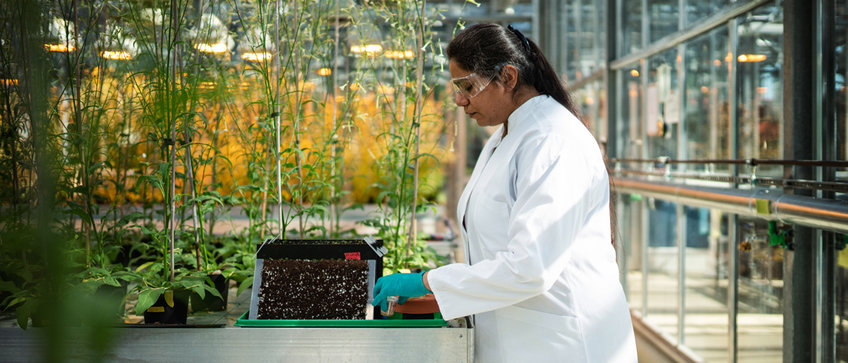
Research Projects
Rayko Halitschke
As the coordinator of the analytical platform I am responsible for the development and optimization of analytical tools in the department of Molecular Ecology. My major research focus is the development of high throughput methods for the metabolic characterization of large populations of recombinant inbred lines (RILs). With a combination of targeted and untargeted metabolomics analysis and ecological phenotyping we are trying to identify important chemical traits mediating biotic interactions and the underlying genetic background regulating them. I am also a member of the Sonderforschungsbereich ‘ChemBioSys’ and the Cluster of Excellence ‘Balance of the Microverse’, which are funded by the German Science Foundation.
My main research focus is the identification of plant traits controlling the interactions with herbivores, their natural enemies as well as pollinators and the recruitment of the plant microbiome using the forward genetics MAGIC platform developed in the department over the last decade. The 26-parent MAGIC mapping population captures a large part of the natural variation found in Nicotiana attenuata throughout its native range. We will use a combination of natural history observations in the field, targeted as well as unbiased metabolomics analyses and microbiome sequencing to identify loci controlling traits involved in these complex ecological interactions. Functional tests using our reverse genetics platform will be conducted at our field sites in Utah and Arizona. This new approach will allow unbiased screening for novel, ecologically important traits and the underlying genetic control, which were elusive targets in reverse genetics experiments based on a priori knowledge of genes.
(Dr. Rayko Halitschke)
Pooja Snehrashmi Mehta
The plant microbiome plays an important role in the protection of plants from various ecological hardships. Nicotiana attenuata uses its microbiome to defend itself against root rot and wilt diseases. It also improves its own phenotype through energy conservation by engaging microbes in performing tasks like nutrient assimilation. Little is known about the basic process involved in the early recruitment of a balanced plant microbiome. Our project focuses on understanding the question: Do plants sculpt their own microbiome by employing a fraction of microbes from the environmental marketplace by the provision of nutrients in the form of root exudates? To gain a functional understanding of the microbiome, we intend to use a native synthetic microbial consortium (nSynCom) in a gnotobiotic system during germination stages. We study alterations in the early germination stage recruitment by using high-throughput molecular platforms to monitor absolute variations in the nSynCom. In order to decipher the metabolite driving the community dynamics, we will exploit the transgenic line toolbox backed by targeted and untargeted metabolome platforms. Further, to study the natural variations observed in the recruitment and maintenance of the microbiome, we will explore Multi-Parent Advanced Generation Inter-Cross (MAGIC) and their microbiome associations through Quantitative Trait Loci (QTL) imputations, eventually testing the hypothesis in field.
(Pooja Mehta, doctoral researcher)
Caiqiong Yang
Triterpenes are widely distributed in the plant kingdom and have a wide range of applications in medicinal, agricultural, and industrial areas. As an ecological model plant, N. attenuata’s triterpene reservoir and their ecological significance remain largely undiscovered; my research interest is to uncover the ecological functions of triterpenes in N. attenuata by utilizing metabolomics, biochemical, genetic and ecological approaches.
(Caiquong Yang, doctoral researcher)